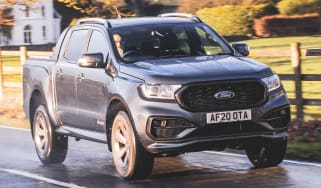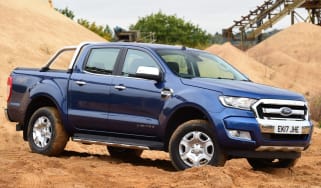Ford Ranger pick-up review
The new Ford Ranger injects more tech and style into the already capable pick-up

The latest Ford Ranger improves on its award-winning predecessor by injecting more style and technology. Its handsome, square-jawed looks and upmarket cabin gives SUVs a run for their money, while the variety of bodystyles and trim levels means there’s a Ranger to suit all needs. The Double Cab version in particular is a great choice for business users who want a capable workhorse that can also serve as a versatile family car when they’re off the clock.
Our choice: Ford Ranger 3.0 EcoBlue Wildtrak
About the Ford Ranger
Clearly we’re big fans of the Ford Ranger at Auto Express, as it’s now won our Pick-up of the Year award five years on the trot from 2019 to 2023. But seeing as the Ranger has also been the best-selling pick-up truck in the UK and Europe, we’re not alone in our admiration of the Ranger.
The previous-generation model was on sale for more than a decade, and had a trophy cabinet fit to burst, however it was very much feeling its age by the time it was laid to rest. That’s when the all-new Ranger strolled into town, with more of a resemblance to Ford’s iconic F-Series pick-up trucks this time around and some big upgrades for the cabin.
More reviews
The Ranger is now longer and wider, while its new bluff front end and more square-jawed looks emulate the Ford F-150. Combined with the distinctive C-shaped daytime running lights and large Blue Oval in the middle of the wide grille, the Ranger has a rather imposing look – not something you’d normally say about a commercial vehicle.
Another cue swiped from its all-American brethren is the Ranger name stamped into the tailgate, opposed to the stickers seen on the old model. Ford also added a handy step to the bodywork behind the rear wheel (on higher-spec variants) after customer feedback found owners were using the rear tyre to step up to access the cargo area. The truck bed is larger, too, while the Ranger still satisfies the one-tonne payload requirement that's needed for a pick-up to qualify as a light commercial vehicle. You can even use the tailgate as a work bench thanks to built-in holes for clamps.
That’s all good stuff, and then you climb inside. The Ranger’s dashboard is dominated by a huge touchscreen, similar to the Ford Mustang Mach-E’s, and running Ford's latest SYNC 4 connected infotainment system.
The competition in the pick-up class isn’t what it once was; now the Nissan Navara, Mercedes X-Class and Mitsubishi L200 are all gone. The Ranger’s closest competition is still the Toyota Hilux as it’s also offered in two and four-door form, and with a variety of trim levels and engines to choose from.
Another key rival is the second-generation Volkswagen Amarok, which actually uses Ranger’s platform, engine and gearbox configurations because the two models are a product of a joint venture between VW and Ford. More utilitarian options include the Isuzu D-Max and SsangYong Musso.
The regular Ranger is offered with two EcoBlue diesel engines: a 2.0-litre turbocharged four-cylinder engine and 3.0-litre V6, although the power output differs depending on which model you go for. Lower-spec models get the four-pot paired with a six-speed manual while the rest of the range features a 10-speed automatic transmission.

The two-door Single Cab Ranger is only available in the most basic XL trim, while the four-door Double Cab can be also had in XLT, Tremor, Wildtrak, Wildtrak X and Platinum specifications. The mid-range Wildtrak comes with pretty much all the kit you might need, including leather upholstery, heated front seats and steering wheel, electrically adjustable driver's seat, dual-zone climate control, privacy glass, comfort suspension, LED lights, keyless entry and starting, digital driver’s display and a 12-inch touchscreen.
Ranger Tremor and Wildtrak X versions are more off-road focused machines that are both fitted with new Bilstein dampers, a steel bash plate, reworked suspension and chassis components, plus some trick systems like Trail Control. It’s essentially a low-speed cruise control, so drivers can select a speed below 20mph and the Ranger will maintain that speed over terrain while the driver concentrates on steering.
For those who want to splurge, Platinum models add luxuries like 20-inch machined alloy wheels, 10-way adjustable, heated and cooled quilted leather seats, open-grain maple wood trim, LED ambient lighting and an eight-speaker B&O sound system.
The Ranger Raptor has also returned for the second-gen model; available with either a 202bhp EcoBlue four-cylinder diesel or a 282bhp EcoBoost V6 petrol engine. Both versions get the 10-speed auto, plus more advanced Fox dampers (which are independently adjustable), launch control, a front diff lock, an anti-lag system to keep its turbos spinning and an Active Exhaust mode with a ‘Baja’ setting that Ford says is not for use on public roads.
MPG, CO2 and Running Costs
Electrification is the aim of the game in the automotive industry right now, as it seems every model is either going electric or being fitted with some kind of hybrid system. Even Ford has launched the all-electric F-150 Lightning in North America. However, the Ranger has stuck with good old diesel power for the most part, which has done nothing to change the pick-up's uneconomical reputation. Especially when features such as auto Stop/Start are reserved for higher-spec models.
According to Ford, in base Single Cab models fitted with a six-speed manual, the 2.0-litre four-cylinder Bi-Turbo EcoBlue diesel will return 33.63mpg on average. Meanwhile, Double Cab models with a more powerful version of the same engine and 10-speed automatic are expected to return between 27.16mpg and 32.1mpg at best, depending on which trim you go for.
At least the Ranger has shown us it can achieve close to its claimed figures. We covered close to 200 miles during our time with a 2.0-litre Wildtrak model and managed to average 31.1mpg. At that rate, with a full 80-litre tank of diesel, you could cover 547 miles between trips to the pumps.
The 3.0-litre EcoBlue V6 is only offered with the auto ‘box and will return 27.9mpg on average in Wildtrak and Platinum trim models. The V6 also proved to be as efficient as Ford claims, as we managed to average 27.5mpg during our group test between the Ranger, Toyota Hilux and Volkswagen Amarok.
Unsurprisingly, the Ranger Raptor is the least efficient of the pack. Equipped with the EcoBlue diesel four-pot, the Baja-prepped performance pick-up will return 26.6mpg. Spring for the top-of-the-range petrol 3.0-litre EcoBoost V6, with all its 288bhp, and Ford reckons you’ll average 20.5mpg.
CO2 emissions range from 220g/km for the base single cab diesel to a whopping 315g/km for the petrol-powered V6 Raptor.
The Ford Ranger’s insurance ratings range from group 39 for the basic single cab in XL trim to group 45 for the largest-engined double cab model in Platinum spec. The Raptor twins sit in group 41 and 42 depending on whether you get the diesel or petrol engine.
You can get personalised car insurance quotes fast with our comparison tool powered by Quotezone...
Load Space and Practicality
The Ford Ranger isn’t a one-size-fits-all pick-up. The base Single Cab is a traditional two-seater pick-up that offers a maximum load length of 2,332mm and 1,207kg gross payload – the highest of the Ranger family.
Step up to the Double Cab and you gain a rear seat bench. The rear seats have been reprofiled to be more comfortable for passengers this time around, and there’s ample space in the back for adults. Rear passengers also get a centre armrest with cup-holders, air vents and USB sockets (one Type A and one Type C) to keep their devices charged. It’s no SUV, but the Ranger can pull double duty as a workhorse and family car when needed now.
All Double Cab Rangers satisfy the one-tonne payload requirement that's needed for a pick-up to qualify as a commercial vehicle, with the XLT model able to haul the most – 1,099kg to be exact.
We measured the bed of the Ranger Double Cab ourselves when we tested it and found the maximum load length to be 1,575mm. We also found the maximum load width is 1,515mm but this narrows to 1,190mm towards the rear of the bed due to the wheelarches. The drop-down tailgate features holes for clamps so that it can be used as a workbench. If you run out of room in the bed, all regular Rangers are rated to tow up to 3,500kg.
The Raptor on the other hand can only tow 2,500kg. Worse still, it has a maximum payload of 652kg, which is some 400kg below the 1,040kg threshold required for LCV classification. Because the Raptor can’t be classed as a light commercial vehicle, it doesn’t qualify for the Benefit-In-Kind (BiK) tax advantage that draws many towards buying a pick-up.
Ford offers enough accessories for the Ranger to fill their own brochure. Take a gander through the options list and you’ll find spray-in bed liners, a flexible rack system and dividers for the load bed, and hard-top canopies that essentially turn the Ranger Double Cab into a full-size SUV. Alternatively, to create a secure storage you can add a conventional soft tonneau cover, a manual roll top cover and even a power-opening roll top cover. You open the latter simply by tapping a button on the key or the inside of the load bed. However we found that the cover’s plastic housing eats up quite a bit of space towards the rear of the load bed.
Reliability and safety
The Ford Ranger has always been near to the top of the pick-up class in terms of safety, and the latest model is no different. It was put through Euro NCAP’s battery of crash tests in 2022 and was awarded a five-star safety rating for its efforts. It received an 84 per cent score for adult occupant protection and safety assistance technology, plus 90 per cent in the child occupant protection category.
All Rangers come with several airbags, seatbelt reminder, ABS, Ford’s ESP+ stability control system, collision mitigation, speed sign recognition, lane keeping aid and a rear-view camera. Additional safety kit is available as part of the several Technology Packs Ford offers, including a 360-degree camera set-up, lane change warning, blind spot monitoring and adaptive cruise control.
It’s too early to gauge the second-generation Ranger’s reliability, but you're never far from a Ford dealer or Transit Centre for a service or if spares are required. All Rangers come with a three-year/60,000-mile warranty, which is pretty standard in this day and age. You do at least get a year of Ford Assistance breakdown cover and a 12-year anti-perforation warranty thrown in. You can also add an extended warranty and service plans should you wish.
Driving and Performance
So far we’ve only had a chance to drive the mid-range Wildtrak and high-performance Ranger Raptor, although we’ve reviewed the Raptor separately here.
Unsurprisingly, the Ranger feels very big to drive on UK roads, but no more than a full-size SUV does. In fact, because of the Ranger's high-set driving position you get a commanding view ahead that’s better than most SUVs, although the tall bonnet does limit the view immediately ahead.
Thankfully models like our Wildtrak test truck come with parking sensors and a 360-degree camera system which provides a clear image of what’s around you via the high-res central touchscreen. We actually found it was easy enough to manoeuvre the Ranger into spaces thanks to its camera system and relatively light steering, although the sheer size of the truck means you will stick out of a typical supermarket parking space by a couple of feet.
The 2.0-litre four-cylinder in the model we drove delivers decent power, but that was without any cargo to haul. We did notice a fair amount of rev hang after lifting off the throttle however, and a noticeable delay in acceleration when you plant your right foot. We suspect the latter is caused by the 10-speed automatic gearbox having to kick down several gears when you demand more power. It can also be quite jerky at lower speeds, but once you’re under way, the 10-speed auto delivers smooth, seamless shifts.
We found the Ranger is at its best when cruising on the motorway, where the 2.0-litre diesel becomes quiet and road noise is kept in check for the most part. There is a noticeable amount of wind noise at higher speed, but that’s to be expected with such a bluff front end as the Ranger’s. Excellent adaptive cruise control and lane keep assistance also help make the Ranger a solid cruiser.
The V6 diesel is a lot smoother than the four-cylinder. It sounds silky at all speeds, and it delivers a decent punch. However, we did find the truck to be a little hesitant to deliver maximum power when accelerating hard, as if it’s restricting power to prevent damage to the transmission. This improves if accelerating while already rolling, where there are instant responses at most speeds.
When it comes to their ride, pick-up trucks need to find a balance between comfort and coping with a one-tonne payload, and the Ranger manages to offer a smooth ride similar to that of an SUV. During our group test between the Ranger, Amarok and Hilux we found the Ford had the smoothest and most comfortable ride of the bunch. That’s thanks in part to the modest 18-inch wheels, higher-profile tyres and Soft Ride comfort suspension that’s fitted to the Ranger Wildtrak we tested. Without any cargo in the bed, you only tend to feel the biggest bumps and imperfections in the Ford, whereas its VW sister car tends to shudder and shake.
Cab and Interior
The Ford Ranger’s interior was already relatively upmarket, at least by pick-up truck standards, but the latest model has gone a good few steps further. In fact, we reckon it could give some well regarded SUVs a run for their money.
As soon as you climb in, your eyes are drawn to the enormous touchscreen that dominates the dashboard. It’s a pretty substantial 10-inch unit in lower-spec models, while others like the Wildtrak we drove feature an even larger 12-inch display. Both versions run Ford’s latest SYNC 4 infotainment that is pretty slick and load times are quick, but the blue font on white backgrounds can be a little distracting.
Apple CarPlay and Android Auto are both standard-fit. They only take up about half the screen, which might disappoint some, however it means you have climate controls and handy shortcuts to settings menu there all the time. It’s also good to see Ford hasn’t given up on good old fashioned physical buttons, with an array of them below the central touchscreen for the climate control and volume.
There’s no shortage of information available on the crisp digital instrument panel, from fuel economy to 4x4 status. The display also changes depending on which drive mode you select, however we weren’t able to display a full map view even when using Ford’s own sat-nav, just turn by turn instructions.
There are a range of driving modes, which you switch through using the rotary dial on the centre console. On top of this are four buttons that allow you to select between two and four-wheel drive modes.
The redesigned cab of the Ranger has boosted space inside, with the addition of an electric parking brake also helping to make more space on the centre console. There’s plenty of storage space, including two cupholders in the centre console, plus two more that pop out from either end of the dashboard, twin gloves boxes and a shelf in between, and another bin under the central armrest. There’s also a tray for your smartphone in the dash, which includes a wireless charging pad in pricier models.
The front seats are wide and comfortable, and offer lots of adjustability, although the headrests were as hard as rocks on the test car we had, even after it had covered over 2,000 miles. The Ranger’s interior door handles take a bit of getting used to as well. They’re inside the grab handles on the doors, so passengers need to be careful if they’re holding the door in case they squeeze the release by accident.
Key touchpoints feel very high quality, including the steering wheel, tops of the doors and centre console. However, poke around a bit and it doesn’t take long to find some hard, scratchy plastics. We have no doubt they’ll be durable, and do suit lower-spec destined to be workhorses, but they’re a bit of let down in the cabin of plusher models which some will be considering as a family SUV alternative.
Pick-up dimensions
|
Body style |
Height |
Width |
Length |
|---|---|---|---|
|
Single Cab |
TBC |
TBC |
TBC |
|
Double Cab |
1,884mm |
1,918mm |
5,370mm |
Load area dimensions
|
Body style |
Height |
Width |
Length |
|---|---|---|---|
|
Single Cab |
TBC |
TBC |
TBC |
|
Double Cab |
1,564mm |
1,224mm |
511mm |
For an alternative review of the Ford Ranger, visit our sister site carbuyer.co.uk…

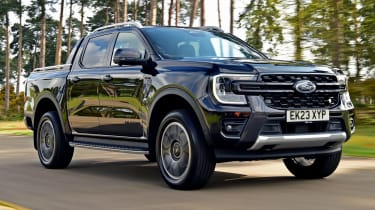

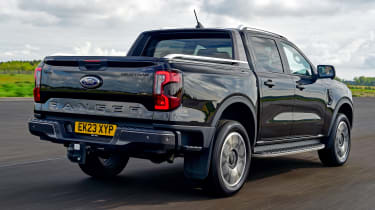
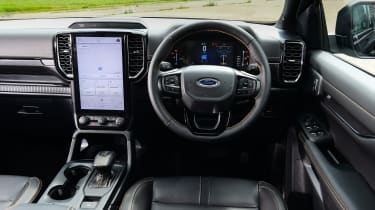

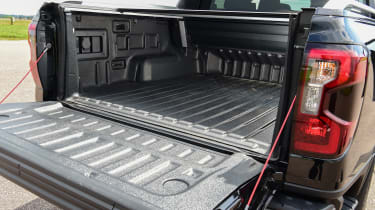

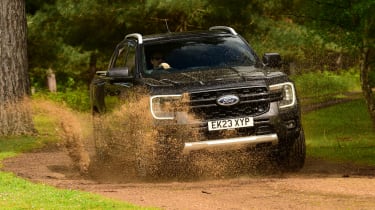

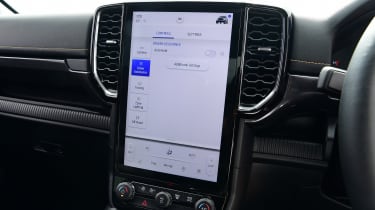

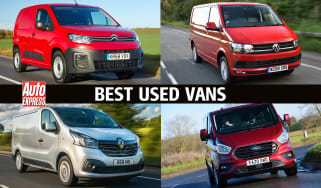
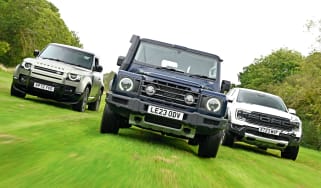
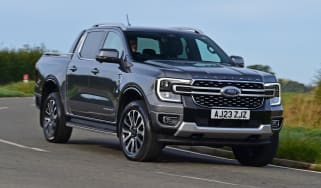
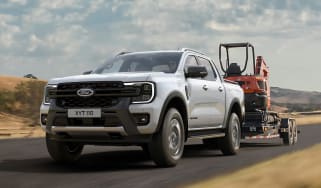
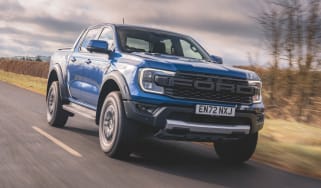

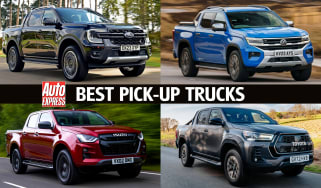
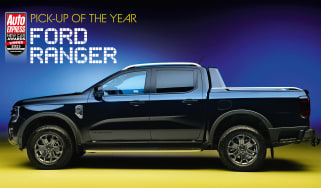
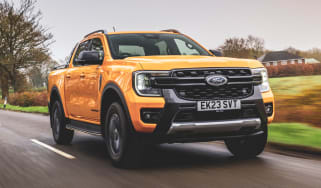
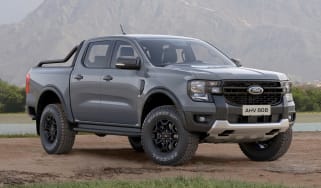
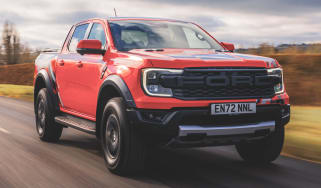
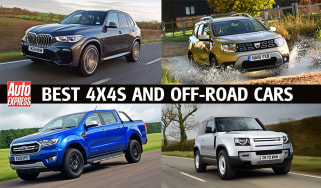
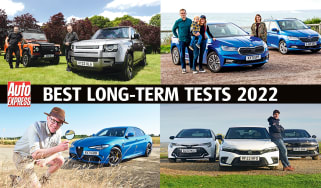
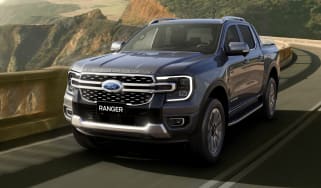
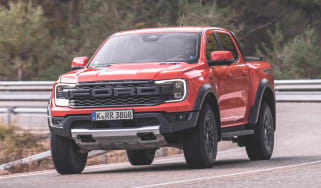
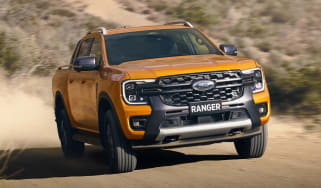
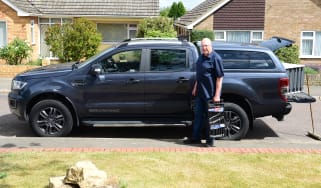
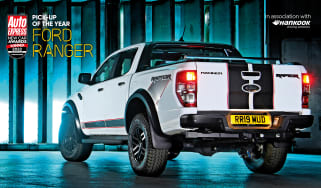
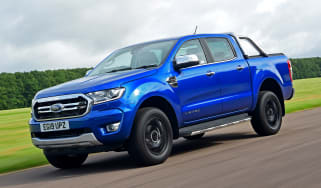
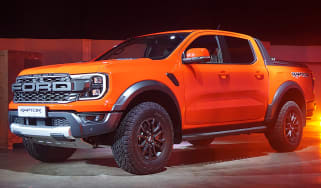
_vlvde2.jpg)
